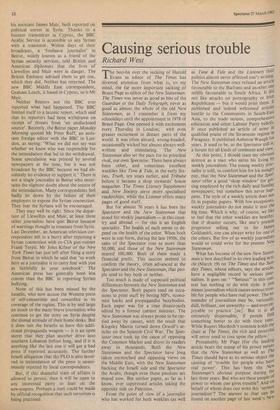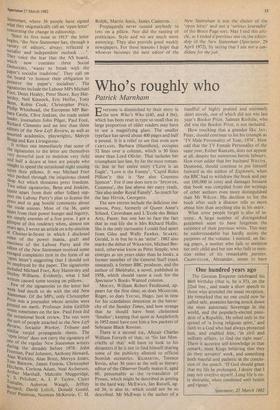Causing serious trouble
Richard West
The hoo-ha over the sacking of Harold Evans as editor of The Times has diverted attention from what is, to my mind, the far more important sacking of Bruce Page as editor of the New Statesman. The Times was never as good as bits of the Guardian or the Daily Telegraph; never as good as almost the whole of the old New Statesman, as I remember it from my schooldays until the appointment in 1978 of Bruce Page. One opened it with excitement every Thursday in London; with even greater excitement in distant parts of the world. It was often absurd, wrong-headed, occasionally wicked but almost always well- written and stimulating. The New Statesman also set the pace for its principal rival, our own Spectator. There have always been other, and sometimes excellent weeklies like Time & Tide, in the early Six- ties, Truth, ten years earlier, and Tribune before it became a shop stewards' house magazine. The Times Literary Supplement and New Society serve more specialised readerships, while the Listener offers many pages of good stuff.
But for almost 70 years it has been the Spectator and the New Statesman that stood for weekly journalism — in this coun- try and abroad — for this is an English speciality. The health of each seems to de- pend on the health of the other. When both were in top form, during the late 1950s, the sales of the Spectator rose to more than 50,000, and those of the New Statesman neared 100,000. Both of them made a financial profit. This success seemed to confirm the theory, often advanced at the Spectator and the New Statesman, that peo- ple tend to buy both or neither.
Too much is made of supposed political differences between the New Statesman and the Spectator. Both papers tend on occa- sions to print stuff by boring MPs, econo- mist hacks and propagandist busybodies. Each paper was for a time disastrously edited by a former cabinet minister. The New Statesman was always prone to be car- ried away by causes, with the result that Kingsley Martin turned down Orwell's ar- ticles on the Spanish Civil War. The Spec- tator once took up the cause of opposing the Common Market and drove its readers away in thousands. Both the New Statesman and the Spectator have long taken entrenched and opposing views on the Middle East, with the New Statesman backing the Israeli side and the Spectator the Arabs, though even those passions are muted now. But neither paper, as far as I know, ever suppressed articles taking the opposite side on Palestine.
From the point of view of a journalist who has worked for both weeklies (as well
as Time & Tide and the Listener) their politics almost never affected one's writing. The New Statesman once refused an article favourable to the Biafrans and another one mildly favourable to South Africa. It did not like attacks on pornography or Irish Republicans — but it would print them. It published and indeed welcomed articles hostile to the Communists in South-East Asia, to the trade unions, comprehensive education and other Labour Party beliefs. It once published an article of mine in qualified praise of the Stroessner regime in Paraguay. It published Auberon Waugh for years. It used to be, as the Spectator still is, a forum for all kinds of comment and view.
At this point, I should state my obvious interest as a man who earns his living by weekly journalism. The young weekly jour- nalist is told, to comfort him for his meagre pay, that the New Statesman and the Spec- tator offer a good 'shop window' for get- ting employed by the rich daily and Sunday newspapers; but somehow this never hap' pens. The style of a weekly article does not fit in popular papers. With few exceptions, weekly journalists do not make it into the big time. Which is why, of course, we like to feel that the other weeklies are healthy that if disaster occurs, like one's present proprietor selling out to Sir James Goldsmith, one can always write for one of the others. But few of us weekly journalists would or could write for the present New Statesman.
What has become of the new New States- man is best described in its own leading arti- cle (March 19) on The Times and the Sun- day Times, whose editors, says the article, have a negligible record in serious jour- nalism. It goes on: "Serious" in this con- text has nothing to do with style: it just means journalism which causes serious trou- ble for people who have real power. The re- mainder of journalism may be, variously, dull, brilliant, not unworthy — and even en- joyable to practice [sic]. But it is all eminently dispensable, if people find something better to do with their time. While Rupert Murdoch's nominee holds the chair at The Times, the rich and powerful will never need to toss upon the pillow: Presumably Mr Page (for the leading article bears the stamp of his prose) means that the New Statesman as well as The Times should have as its serious object the causing of 'trouble for people who have real power'. This has been the New Statesman's obvious purpose during the last three years. But who are these people of power to whom one gives trouble? And on behalf of whom does one write this 'serious journalism'? The answer to that can be found on another page of last week's New Statesman, where 36 people have signed what they enigmatically call an 'open letter' concerning the change in editorship. `Since its first issue in 1913' the letter begins, 'the New Statesman has, through a variety of editors, always reflected a socialist and independent outlook .. . '. They voice the fear that the NS board, which now contains three Social Democrats, 'wants to break with the Paper's socialist traditions'. They call on the board `to honour their obligation to preserve the paper's socialism'. The signatories include the Labour MPs Michael Foot, Denis Healey, Peter Shore, Roy Hat- tersley, Neil Kinnock, Eric Heffer, Tony germ Robin Robin Cook, Christopher Price, Philip Whitehead, the European MP Bar- bara Castle, Clive Jenkins, the trade union leader, journalists John Pilger, Paul Foot, Richard Clements and no less than three editors of the New Left Review, as well as ,assorted academics, playwrights, Melvyn Bragg and Ken Livingstone. It strikes one immediately that some of the signatories to the letter are themselves very powerful (not to mention very rich) and half a dozen at least are people who sought to spend the occasional night tossing upon their pillows. It was Michael Foot Who pushed through the iniquitous closed shoP Act which threatens press freedom. Two other signatories, Benn and Jenkins, (quite apart from their other follies) sup- Port the Labour Party's plan to license the Press and to gag hostile comments about the trade unions. Most of the 36, quite apart from their power hunger and bigotry, are simply enemies of a free press. I got a glimpse of this tendency when, almost ten Years ago, I wrote an article on a by-election at Chester-le-Street in which I disclosed some of the power mania, graft and nastiness of the Labour Party and the editor of the New Statesman received some enraged complaints (not in the form of an °Pen letter') suggesting that I should not be employed by the paper. The signatories included Michael Foot, Roy Hattersley and Shirley Williams. Evidently, what I had written caused some tossing on pillows. Few of the signatories to the letter last Week had much to do with the old New Statesman. Of the MPs, only Christopher Price was a journalist whose articles were Printed on merit. Professor John Griffith wrote sometimes on the law. Paul Foot did the occasional book review. The rest were the sort of people attached to the New Left Review, Socialist Worker, Tribune and similar turgid propaganda sheets. The °Pen letter' does not carry the signature of tie of the regular New Statesman writers during the decades before 1978: John Freeman, Paul Johnson, Anthony Howard, Alan Watkins, Alan Brien, Mervyn Jones, c.nn Baistow, James Fenton, Christopher linhens, Corinna Adam, Neal Ascherson, Arthur Marshall, Malcolm Muggeridge, Y' S. Pritchett, A. J. P. Taylor, Claire °rualio, Auberon Waugh, Jeffrey Bernard, David Leitch, Donald Gould, Peter Paterson, Norman McKenzie, C. H.
Rolph, Martin Amis, James Cameron.
Propaganda never caused anybody to toss on a pillow. Nor did the ranting of politicians. Style and wit are much more annoying. They also provide good weekly newspapers. For these reasons I hope that whoever becomes the next editor of the
New Stales,)nan is not the choice of the `open letter' and not a 'serious journalist' of the Bruce Page sort. May I end this arti- cle, as I ended d previous one on the editor- ship of the New Statesman (Spectator, 29 April 1972), by saying that I am not a can- didate for the job.





































 Previous page
Previous page